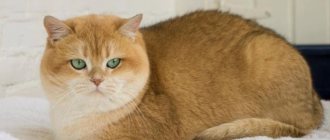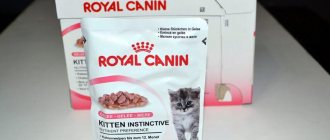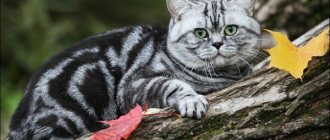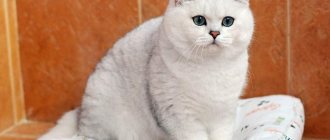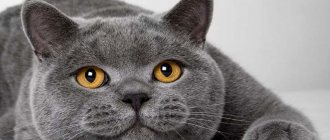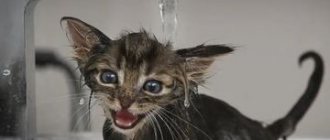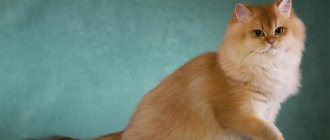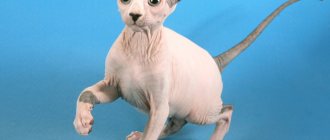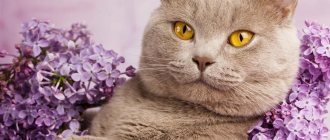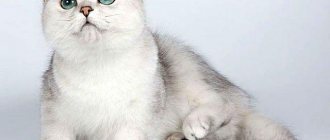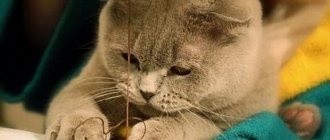The British Golden Chinchilla is the name for the color of British cats, or simply a subspecies of the British. The breed itself is distinguished by its amazing kindness and complaisance. It is this color that arouses the greatest interest among breeders of purebred cats, as it is very rare. The homeland of this incredible beauty is considered to be Great Britain, which is where the name British cat comes from. She belongs to the young breeds. A distinctive feature is a very beautiful, fluffy and soft coat.
Origin of the species and description
Breeders from Great Britain artificially bred it as a result of crossing Persians with the British. Today, there are several options for the origin of this type of breed. The origin story is described differently in different sources. Some indicate that the subspecies was first bred in England, while others indicate that scientists and breeders from America were involved in their breeding.
They were called chinchillas due to the fact that their color is very similar to the natural color of chinchillas. British scientists selected exclusively smoky or peach-colored cats for crossing. Initially, as a result of experiments, animals with green eyes and chinchilla color appeared.
Video: British Golden Chinchilla
The very first kitten was born as a result of crossing in 1882. A female kitten named Shannie was born from a Persian cat and a British smoke-colored cat. After this, breeders continued to work on developing ideal representatives of this breed. In 1889, a kitten was born who was named Silver Lambkin. It is this kitten that is considered the ancestor of this type of breed. It was presented as a result of breeding work at numerous exhibitions, where it became a multiple winner.
Interesting fact: Swedish Princess Victoria adored these animals and kept several representatives of this breed in her palace. The princess called them plushies and in every possible way contributed to their breeding and distribution.
For a long period of time, breeders sought to breed cats that would have emerald eyes. However, admixtures of different breeds did not allow achieving the desired result.
What are they?
Golden chinchillas come in short-haired and long-haired varieties. If it seems that caring for long hair is more difficult than short hair, then this is, of course, a misconception. Any animal needs care, and seasonal shedding simply cannot be avoided, either by animals with long or short hair. Everyone needs to be brushed constantly.
According to breed standards, golden chinchillas with green eyes are most often found, but options with blue and yellowish eye tints are not excluded. The blue color is mainly found in silver chinchillas.
Golden British chinchillas should not have a pronounced pattern on their coat; as a rule, these are soft and gentle transitions from one shade to another.
Appearance and features
The British Golden Chinchilla has external characteristics typical of British cats. Representatives of this breed have a rather large body and a wide chest. Cats have a straight back line and a defined hip line. The body is quite squat with well-developed muscles.
Representatives of this breed have characteristic features:
- neat rounded head shape with a wide, majestic forehead;
- pronounced, large cheeks and cheekbones;
- wide, short, straight nose;
- the tip of the nose is pink or peach-colored;
- the ears are small, rounded, widely spaced from each other;
- the neck is shortened, muscular and strong;
- large, expressive eyes that are quite deep-set;
- limbs are short and strong, rounded, arranged proportionally. In the spaces between the toes there are tufts of thick hair;
- the tail is short, not long, thick.
Individuals of this species exhibit pronounced sexual dimorphism. Males have larger body sizes and weight. The average body weight of males is 6-8 kilograms, females 3-3.5 kilograms. Spayed or neutered individuals can reach almost double their body weight. The coat of British cats is quite dense, short and dense with a well-developed undercoat.
Among the colors, I distinguish three main types:
- silver - white predominates in this color scheme. The color is distributed in such a way that the undercoat is completely white, and the tips are darker, almost black. The chest and abdomen area is crystal white, the pads of the limbs, on the contrary, are black. The area of the eyes and nose is highlighted with a black outline, as if outlined with a pencil;
- golden - undercoat of a pronounced, rich apricot color. The tail, side surface of the body and the back line are painted in a darker color. The chest and belly area is a softer, lighter caramel color;
- ash - when compared with the usual silver color, the coat is darker. This is due to the fact that the guard hair is colored one-third dark, and the silver color is characterized by the guard hair being dyed the main color by 1/8. There are stripes of a darker color on the body, although they do not have clearly defined boundaries. Between the toes the fur is dark, almost black;
- Zoologists and breeders identify another color - color point. They have more pronounced external characteristics of Siamese cats. They are distinguished by the presence of blue eyes. And a darker eye color in the area of the ears, tail and eyes.
Health
The key to the health of British chinchillas is a strong immune system, which is supported by:
- proper balanced nutrition;
- constant care, which necessarily includes regular deworming and vaccinations.
If an animal is not purchased for breeding, then veterinarians recommend castrating or sterilizing it. This is due to the fact that animals that are not bred get sick much more often. In addition to physiological diseases, they also suffer morally, especially cats.
Animals that do not meet British breed standards or have minor defects are also required to be sterilized.
Castrated and sterilized cats are very often susceptible to the development of urolithiasis (UCD). To prevent it from occurring or reoccurring, you should give the animal a special herbal medicine several times a year, which will be prescribed by a veterinarian. For example, the drug “CotErwin” is very often prescribed. A special diet is also recommended, which should not contain fish products.
Sometimes, if there is a lack of vitamins, you can find that the cat is apathetic, has begun to shed heavily, and its fur has changed color. To resolve this problem, it is best to contact a specialist, since the owner cannot always decide which vitamins are suitable for the animal and which are not. If you act at random, the situation can only worsen.
British chinchillas are believed to have good health, but they are not immune to illness.
Before vaccination, the animal must be given an anti-parasite drug (it is best to use suspensions rather than tablets, as many British people are very picky).
After every walk outside, cats should wash their paws. If you notice that your pet has become lethargic, does not eat for a long time, or behaves strangely, it is best to immediately take him to the veterinarian.
- With a viral disease, the animal may begin to cough and sneeze, and also refuse to eat. Such symptoms cannot be ignored, since viral diseases for cats can be fatal, for example, calcivirosis or panleukopenia. They are vaccinated against them.
- Any digestive problems may be associated with gastritis or other gastrointestinal diseases. Diarrhea, refusal to eat and other similar symptoms in an animal may indicate a viral infection or poisoning.
- Ringworm is also very common in representatives of the British breed. Caused mainly by fungi. It is quite easy to treat if started in a timely manner.
Of course, many diseases may have similar symptoms, and therefore self-medication is strictly prohibited. But it is worth noting that complex vaccinations, for example, “multifel-4”, are very effective and can protect your pet from several viral diseases at once.
Where does the British Golden Chinchilla live?
As representatives of an aristocratic breed, cats need special living conditions. Before you get such a cat, you should think about whether you can provide him with the proper living conditions. A prerequisite for a comfortable existence is cleanliness and order. Another important criterion is the optimal room temperature. These cats are not intended to be kept in outdoor conditions. They cannot tolerate cold, so the room temperature must be at least 22 degrees.
Unlike other cats, they tolerate loneliness well, and even love it. The less people and attention there are for the Scots, the more comfortable they will feel. However, they require attention and participation from the owner in their life. Coming home from work, the owner must take pity on his pet and pay attention to it. Be sure to keep your cat's ears clean. This is the weak point of representatives of this breed. Often, due to untimely cleansing, cats develop infection, suppuration, and infectious processes.
Such an aristocratic animal definitely requires personal space. In this regard, it is necessary to take care of the arrangement of the “house”. It is best if it is located in a secluded place, hidden from prying eyes. It cannot be said that golden chinchillas are demanding in terms of living conditions and care. However, there are some guidelines that you need to follow.
Animals' eyes should be wiped with a cotton pad moistened with boiled water. A weak solution of chamomile can be used as a solution. Cats need to brush their teeth once a day. Teeth cleaning is carried out with special hygiene products that are sold in veterinary pharmacies. Animals' nails should be trimmed at least once a month.
Ready-made feed
Many owners prefer to give their Britons dry food and wet canned food - it’s convenient and simple. But the products must be of high quality - not lower than premium.
It is better to avoid buying cheap food from the nearest supermarket. Economy class food contains practically no natural meat. But they contain ballast substances, dyes, flavors and other harmful components.
You should carefully study the composition of the feed. Meat should come first. Good products contain vitamins, minerals and amino acids that support the health and strengthen the immune system of the British cat. A minimum of carbohydrates is encouraged - they lead to weight gain.
Selection of industrial feed
Owners of British cats consider the following brands to be the best food:
- Earthborn Holistic;
- Go! Natural Holistic;
- Bosch Sanabelle Grande;
- Acana;
- Orijen;
- Eukanuba;
- Eagle Pac Cat Holistic;
- 1st Choice.
This is a super premium class and holistic food. They are quite expensive, but their composition fully satisfies the needs of the cat's body.
If your budget is limited, you can purchase premium food for the British:
- Purina Pro Plan;
- Brit Premium;
- RoyalCanin;
- Hill's.
The Royal Canin company produces a special food for British kittens that can be fed to babies aged 4 to 12 months - British Shorthair Kitten. It is highly digestible and contains prebiotics that support the functioning of the gastrointestinal tract.
Royal Canin produces British Shorthair Adult food for adult cats. It helps Britons maintain muscle mass. Omega-3 fatty acids strengthen joints and maintain their mobility.
For kittens, pregnant, lactating, spayed, neutered, elderly cats or pets with any diseases, buy food from specialized lines. All well-known manufacturers have such names.
Before choosing food for your British cat, it is better to consult a veterinarian. He will give individual nutritional recommendations.
What does the British golden chinchilla eat?
Cats should be fed only fresh, high-quality food or ready-made balanced food specifically for cats. For nutrition to be balanced, the food must contain at least 35% protein.
Interesting fact: The owner is strictly prohibited from mixing different types of ready-made food for one feeding. This can cause illness and digestive problems.
You also need to count calories. This is not difficult if you use ready-made food as a source of nutrition. The average number of calories for one adult is 70 kcal per kilogram of live weight. It is also necessary to ensure constant access to fresh, clean water. It must be changed daily. It is better to pour bottled or filtered water into the bowl. You can’t exclude natural foods from your diet. If the diet is balanced, the animal will be healthy and active.
What is included in the animal’s natural diet:
- raw lean meat;
- boiled or stewed offal (liver, heart, lungs);
- sea white fish, which is cleaned of bones;
- dairy products with a low fat content (cottage cheese, yogurt without fillers, sour cream);
- two or three times a week you can give cats boiled eggs (preferably quail);
- boiled vegetables several times a week (preferably homemade vegetables - potatoes, carrots, potatoes);
- boiled porridge (buckwheat, rice, millet).
Interesting fact: Before giving raw meat to your cat, you need to freeze it for 10 hours to disinfect it. Before serving, it is defrosted and poured with boiling water. Be sure to cut the meat into small pieces.
If the animal has silky, soft and shiny fur, then the cat is well-nourished, and its diet is filled with everything it needs. There is a list of products that are strictly contraindicated to be included in the diet of animals.
What is forbidden to give:
- canned food;
- smoked meats;
- sausages and sausages;
- hot, salty and spicy dishes;
- raw cow's milk;
- canned meat or fish.
This breed of cat is prone to overeating and obesity. In this regard, the owner must himself dose the amount of food required for the normal growth and development of his pets. It is better to feed them in small portions five to six times a day. Be sure to sow special cat grass in the autumn-spring period, which cats can nibble.
Now you know what to feed your British golden chinchilla. Let's see how to breed these cute cats.
Content
The main thing in caring for a cat of this breed is grooming.
It needs to be washed and combed regularly. Combing has its own characteristics: first you should go through the hair growth with the comb, and then against the hair. This procedure can be carried out for British and Scottish cats once every 2 weeks, as their fur is plush and springy and less prone to rolling into lumps. But the Persian chinchilla needs to be brushed twice a week, in this case the coat will be smooth, tangles will not appear on it, and the cat will always feel excellent. To prevent pets from damaging their owners’ furniture, they need to be taught to use a scratching post from childhood. Once every 2 weeks you need to carefully trim one third of the upper part of the claws, using special nail clippers for this. It should be taken into account that of all the representatives of chinchillas, the most heat-loving are the Scots; if the temperature in the house drops below 20 degrees, then they immediately become uncomfortable
Therefore, it is important to monitor the temperature to prevent freezing, especially if the pet has to spend time alone for a long time
In addition, when leaving for work, you need to provide toys and sufficient space to move around (do not leave it in just one room), then the animal can easily cope with the absence of its owners at work or school. If you want to walk your pet, then in the city it would be advisable to use a harness. If the cat lives in a private house or the family has a country plot, it is better to walk it in the garden.
Nutrition
You can feed the animal with special food or natural food. The following foods are preferable from a regular diet.
- Finely chopped chicken, turkey or rabbit. It can be boiled or raw, but scalded with boiling water. Can be given daily.
- Boiled sea fish. It is better to feed 1-2 times a week.
- Dairy products: yogurt, kefir, low-fat cottage cheese. Give no more than 2 times a week.
- Quail eggs – 2 times a week.
- Buckwheat porridge cooked in water - 2-3 times a week.
- Bone flour. It should be used as a supplement. Required dose: 1-2 teaspoons 2-3 times a week. It is better to mix flour with meat.
The following foods are prohibited for chinchillas:
- sweets (chocolate, candies, caramel);
- raw cow's milk;
- smoked meats;
- pickles;
- spicy dishes.
With a natural diet, special vitamins should be given. When consuming ready-made food, you can do without them, since they are already included in its composition. A properly selected diet guarantees excellent appearance and well-being for your pet. The coat will always be silky and shiny, and the behavior will be active.
Hygiene
Chinchillas, like most cats, do not like to be bathed, so you should wash them entirely only when necessary and infrequently. For washing, you can use special shampoos, making sure that the foam does not get into your eyes and ears. The frequency of hygiene procedures depends on the breed.
The English (British) are more clean, they wash their paws and tongue very often. Owners only need to wipe their eyes once a day with a cotton swab, moving it from the outer corner of the eye to the nose and removing any lumps that have formed. The British beauty's ears can be wiped once a month with a cotton pad moistened with warm boiled water.
Persian and Scottish chinchillas require more frequent care from their owners.
If necessary, any dirt that appears from the face and paws should be removed carefully with a damp cloth.
It is advisable to brush your pet’s teeth once a day; you need to get used to this procedure as early as possible. It is much more difficult to train an adult cat to brush its teeth than a kitten. Teeth cleaning products can be purchased at a pet store.
It is important to keep the tray clean. The choice of fillers is varied, there are also those that completely absorb odor
If the cat's litter box is always clean, then the animal will always use it and will never mess up outside of it.
Features of character and lifestyle
British golden chinchillas are distinguished by a gentle disposition, which is combined with independence and pride. With good care and love, the animal sincerely becomes attached to its owner with all its heart, at the same time considering itself to be his equal. Cats of this breed are very calm, balanced and not at all emotional. It is unusual for them to show their feelings; in any situation they prefer to take the position of an observer and not take any part in the affairs of others. Many cats perceive observation as their immediate responsibility.
To live in harmony with such an amazing beauty, you must sincerely love animals. It is unlikely that such a cat will be perceived as a plush toy. Cats endure all forced squeezing, hugging and expression of their feelings with their characteristic composure and detachment. They do not particularly welcome this method of communication, but they do not show aggression. These cooks don't like too much attention, a lot of people and noise around. They are lovers of a measured, understandable and familiar way of life.
It is unlikely that you will be able to achieve anything from animals using force and pressure. An animal listens to a person and does something only if the person is perceived by them as an authority. Chinchillas are very smart and quick-witted, making them highly trainable with the right approach. They are always ready to make contact if they respect and love their owner.
Golden chinchillas are real aristocrats, as they quickly get used to order and try to adhere to it throughout their lives. They will never cause mischief or damage property. Animals are considered very proud, it is unusual for them to beg and beg for food, they will not be content with scraps from the master’s table, even if they are too hungry. Communication with children is perceived by cats as incredibly evil. They do not like children too much, but they tolerate them, trying at every opportunity to simply hide from their obsessive attention and genuine interest.
Breeding
Golden chinchillas are very expensive to breed. The price of individuals for castration or sterilization usually varies between 15-40 thousand rubles, and for breeding an animal with all the documents and pedigree can cost as much as 100 thousand rubles.
Knitting animals is not recommended for amateurs. It is worth understanding that only specialized nurseries are engaged in such professional activities. But if you want to start your own business, then you should weigh the pros and cons, calculate all the costs and think about where the animals will be kept. And only then should you purchase a pair of beautiful golden chinchillas.
Mating is a painstaking task, and so is caring for a pregnant cat.
Social structure and reproduction
It is recommended to breed animals by professionals who have experience in this field. The British Golden Chinchilla is bred mainly in specialized nurseries. Before breeding cats at home, you should study the intricacies of this matter. Zoologists warn that this breed is not fully formed. During mating and pregnancy, cats need special care and attention. The first step is to take care of choosing suitable partners for breeding.
Criteria for selecting partners:
- the presence of all the characteristics characteristic of this breed in candidates for mating;
- absence of diseases and hereditary pathologies;
- healthy appearance;
- activity;
- availability of all necessary documentation;
- availability of a vaccination passport and all vaccinations in it.
Golden chinchillas are characterized by late development. It is recommended to get them at a time when they become independent, can go to the toilet on their own and eat adult food.
Tips for choosing a kitten, estimated cost
Fur babies are an expensive purchase. British, Scottish or Persian chinchilla kittens cost $500–$1,000 or more. It is recommended to buy animals only from trusted breeders. It is not worth purchasing a pet without documents at a lower price: this is a big risk of wasting money.
When choosing a golden chinchilla kitten, you should look at both parents. The color of this species is very unstable; it is impossible to predict what the baby will become when it grows up. The ideal shade can be obtained only from the offspring of individuals of the same color.
It is advisable to keep an eye on the selected baby. A healthy kitten should be active, playful, with beautiful shiny fur and a soft belly. If your pet's belly is hard, it most likely has worms.
Nurseries sell kittens no younger than 3 months of age. It makes no sense to buy younger animals: they will not yet be able to do without their mother. When purchasing, be sure to check the baby’s pedigree, vaccination passport, and sign an agreement with the breeder.
What the character of a chinchilla kitten will be can be understood using the following tests. You should take the kitten away from the others and observe its reaction. If he explores the area, he will become quite curious in the future. A baby who was scared and trembled with fear, as he grows up, will not be very sociable and is unlikely to suit people who dream of a pleasant companion.
Natural enemies of British golden chinchillas
Due to the fact that animals live exclusively in domestic conditions, they have practically no natural enemies. By nature, cats are endowed with strong immunity and an incredibly stable psyche. However, they will require certain living conditions, regime and diet. If the rules for keeping animals are not followed, the risk of developing various diseases increases.
The following diseases are typical for this breed:
- polycystic kidney disease;
- retinal atrophy of the eyeballs;
- diseases of the gastrointestinal tract;
- malignant neoplasms;
- hypertrophic cardiomyopathy.
Each of the above diseases can lead to the death of the animal. If your cat becomes lethargic, indifferent to everything, her appetite decreases, and she refuses her favorite treats, you should immediately contact a veterinarian. Representatives of this breed are very sensitive to drafts. They can get pneumonia if kept in drafty or damp conditions.
To exclude oncological formations of the reproductive system, it is recommended to castrate cats and sterilize cats if you do not plan to breed them. It is best to have surgery at 6-7 months of age. It is also recommended to promptly take animals to the veterinarian for vaccination. In addition, it is necessary to regularly brush your pets' fur. Otherwise, when licking yourself, the hair gets into the stomach and can cause serious health problems and disrupt the functioning of the digestive tract.
Health
The health of an animal is made up of two factors - heredity and characteristics of care. By nature, chinchillas have a fairly strong immune system, but the breed still has characteristic diseases.
Polycystic kidney disease
With this pathology, the renal parenchyma is replaced by cysts. They put pressure on the organ, which reduces the functionality of the kidneys, causing nephritis and nephrosis. It is almost impossible to determine the disease at the initial stage. Polycystic disease is diagnosed when the cysts become large, cause pain, and the cat’s belly increases in size.
If the cysts are well palpated, unfortunately, it is no longer possible to save the cat - the kidneys actually stop working, and instead of kidney tissue there are cysts. At this stage of the animal's life, the cat is either euthanized or given a certain diet and medication to ease its suffering.
Hypertrophied cardiopathy
With this pathology, the walls of the ventricle of the heart muscle thicken. This provokes heart failure, thromboembolism and even sudden cardiac arrest of the animal. The disease can only be diagnosed using ultrasound. Shortness of breath and rapid fatigue of the pet can be a signal for the need for it.
Retinal atrophy
The disease is the death of light-sensitive receptors located on the surface of the retina. Alarming signs of the disease are night blindness (decreased visual acuity at dusk and in the dark), greatly dilated pupils, and increased shine of the eyes. With a mild form, the animal begins to see poorly in the dark, while a severe form threatens the individual with complete blindness. There is currently no effective treatment.
It is important to follow the vaccination schedule. Representatives of this breed are vaccinated against the following diseases:
- rabies;
- rhinotracheitis;
- feline distemper;
- calcivirus
After the first injections, revaccination follows at 2.5-3 months. Then vaccinations are given once a year. As a rule, the veterinarian himself selects the appropriate drug. In most cases, Nobivak, Trikat and Quadrikat are used as the compositions that are most favorably tolerated by the animal’s body.
About the British chinchilla, see the following video.
Population and species status
Today, the British Golden Chinchilla is a fairly common breed. These cats are bred almost all over the world. These cats are very loved for their patience, endurance, silence and aristocratic endurance. They will never bother their owners.
They tolerate loneliness well, although in the presence of their owner they really need his attention and care. Cats of this breed are intended for breeding exclusively at home. They, like true aristocrats, are connoisseurs of comfort, coziness and convenience.
Breeders and connoisseurs of purebred cats value them very much for their intelligence and intelligence, for which British chinchillas are so famous. It is recommended to get representatives of this breed at an early age, as they quickly get used to the owner and the environment.
The British Golden Chinchilla is an amazingly beautiful cat. She has an incredible mind and intelligence, for which she is loved and appreciated by lovers of valuable breeds of animals from all over the world. Cats of this breed are very attached to their owner, although they really love and value their personal space and independence. At the same time, they give a lot of positivity and positive emotions in the process of communicating with them.
What is the price
The silver chinchilla cat breed is included in the middle price category. The cost of a kitten ranges from 30 thousand rubles. up to 70 thousand rubles. There are 3 price categories:
- pet class - chinchilla kittens have a low cost and are purchased as pets, since they have flaws in appearance and are not intended for showing and breeding.
- Breed- and show-class - these cats have a high price category and are intended for exhibitions and selection.
To summarize, we note that you should get a pet like a silver chinchilla without hesitation, since the cat will decorate any home and easily make friends with children and other animals.
Vitamins
To help the animal cope with the disease, support its immune system, and increase resistance to diseases, introduce vitamins into the diet. They are sold in tablet form to ensure proper daily dosage.
The MagiZoo website presents multivitamin complexes for chinchillas:
Quick view
DOCTOR ZOO multivitamin treat for chinchillas (60 tablets)
60 tablets
86 ₽
Show all offers
The vitamin complex includes phosphorus, vitamins of groups A, C, B, E, biotin, iodine, amino acids, fiber, ash components, etc.
Psychology
A striking example that allows you to get acquainted with the main advantages and characteristics of the breed is the Persian chinchilla cat.
- This animal is distinguished by its playful disposition and curiosity. Therefore, owners who have the same restless character will find a good friend in her;
- Chinchilla cats must constantly participate in a variety of games, otherwise they will become very lazy, lethargic and apathetic animals. And this will not benefit their physical condition;
- Chinchilla cats show a special interest in children. Although animals do not shun them, at the same time they will not indulge them in any whim;
- British chinchillas are not able to establish friendly relations with another cat living in the house. Silver lambkins are capricious animals that recognize superiority only to themselves, therefore, when they encounter an enemy on the border territory, they will quickly let him understand his place.
Compared to the usual British cat, the chinchilla cat of the British breed has a slightly different behavior. She is distinguished by a pronounced aristocracy and a very gentle character.
- These are very sweet and calm creatures, which at the same time demonstrate high intelligence and intelligence.
- British chinchilla cats are prone to conversation. And, although their vocabulary includes only two words - “purr” and “meow”, they pronounce them with different intonations, which seems as if a completely reasonable dialogue is taking place between the owner and his pet.
- Chinchillas are animals with manners, so they will react critically if someone invades their personal space. They will happily allow you to pet them, but you will face aggression if you try to cuddle or pinch them.
- Cats have very developed intuition, so they understand what role they play in the house, and build their behavior in accordance with this. In all their actions they demonstrate impressiveness, which is manifested not only in their gait, but also during rest.
Although these British cats have a common color, the difference in the breed clearly shows how different they are from each other. If you want to get yourself a chinchilla kitten, then be prepared to immerse yourself in a new world that the external beauty of this animal will give you.
